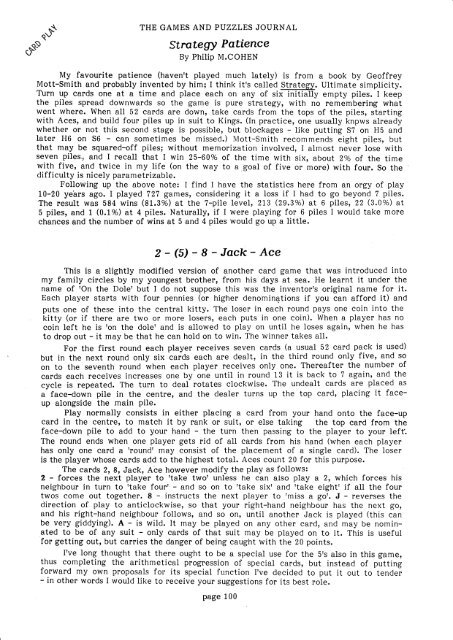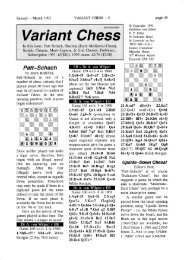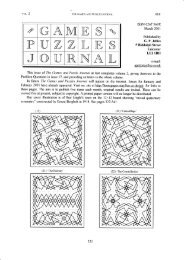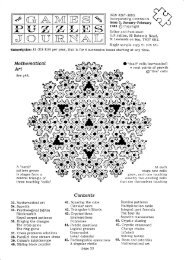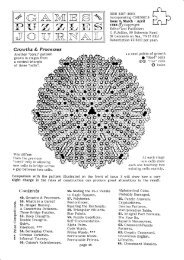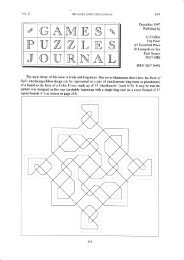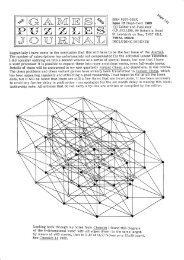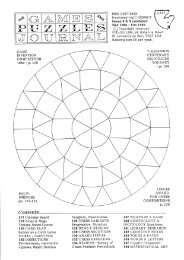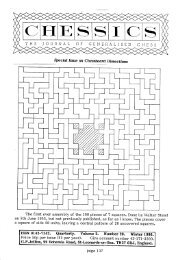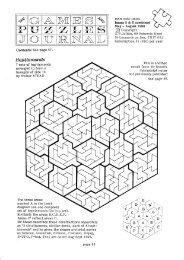The Games and Puzzles Journal, #7 - Mayhematics
The Games and Puzzles Journal, #7 - Mayhematics
The Games and Puzzles Journal, #7 - Mayhematics
You also want an ePaper? Increase the reach of your titles
YUMPU automatically turns print PDFs into web optimized ePapers that Google loves.
"s-.rTHE GAMES AND PUZZLES JOURNALStrotery PotienceBy Philip M.COHENMy favourite patience (haven't played much lately) is from a book by GeoffreyMott-Smith <strong>and</strong> probably invented by him; I think it's called Strategy. Ultimate simplicity.Turn up cards one at a time <strong>and</strong> place each on any of six initially empty piles. I keepthe piles spread downwards so the game is pure strategy, with no remembering whatwent where. When all 52 cards are down, take cards from the tops of the piles, startingwith Aces, <strong>and</strong> build four piles up in suit to Kings. (In practice, one usually knpws alreadywhether or not this second stage is possible, but blockages - like putting S? on H5 <strong>and</strong>later H6 on 56 - can sometimes be missed.) tvtott-Smith recommends eight piles, butthat may be squared-off piles; without memorization involved, I almost never lose withseven piles, <strong>and</strong> I recall that I win 25-60% of the time with six, about 2% of. the timewith five' <strong>and</strong> twice in my life (on the way to a _.goal of five or more) with four. So thedifficulty is nicely parametrizable.Following up the above note: I find I have the statistics here from an orgy of play10-20 ye'ars ago. I played 727 games, considering it a loss if I had to go beyond 7 piles.<strong>The</strong> result was 584 wins (81.3%) at the ?-pile level, 213 (29,3%) at 6 piles, 22 (3.0vo) at5 piles, <strong>and</strong> 1 (0.1%) at 4 piles. Naturally, if I were playing for 6 piles I would take morechances <strong>and</strong> the number of wins at 5 <strong>and</strong> 4 piles would go up a little.2 - 6) - 8 - Jock- AceThis is a slightly modified version of another card game that was introduced intomy family circles by my youngest brother, from his days at sea. He learnt it under thename of tOn the DoIe' but I do not suppose this was the inventor's original name for it.Each player starts with four pennies (or higher denomingtions if you can afford it) <strong>and</strong>puts one of these into the central kitty. <strong>The</strong> loser in each round pays one coin into thekitty (or if there are two or more losers, each puts in one coin). When a player has nocoin left he is 'on the dole' <strong>and</strong> is allowed to play on until he loses again, when he hasto drop out - it may be that he can hold on to win. <strong>The</strong> winner takes all.For the first round each player receives seven cards (a usual 52 card pack is used)but in the next round only six cards each are deal.t, in the third round only five' <strong>and</strong> soon to the seventh round when each player receives only one. <strong>The</strong>reafter the number ofcards each receives increases one by one until in round 13 it is back to 7 again, <strong>and</strong> thecycle is repeated. <strong>The</strong> turn to deal rotates clockwise. <strong>The</strong> undealt cards are placed asa face-down pile in the centre, <strong>and</strong> the dealer turns up the top card, piacing it faceupalongside the .main pile.Play normally consists in either placing a card from your h<strong>and</strong> onto the face-upcard in the centre, to match it by rank or suit, or else taking the top card from theface-down pile to add to your h<strong>and</strong> - the turn then passing to the player to your leff.<strong>The</strong> round ends when one player gets rid of all cards from his h<strong>and</strong> (when each playerhas only one card a rroundr may consist of the placement of a single card). <strong>The</strong> loseris the player whose cards add to the highest total. Aces eount 20 for this purpose.<strong>The</strong> cards 2, 8, Jack, Abe however modify the play as follows:2 - forces the next player to ttake twor unless he can also play a 2, which forces hisneighbour in turn to ?take four' - <strong>and</strong> so on to 'take sixr <strong>and</strong> ttake eightt if atl the fourtwos come out together. 8 - instructs the next player to 'miss a go'. J - reverses thedirection of play to anticlockwise, so that your right-h<strong>and</strong> neighbour has the next go,<strong>and</strong> his right-h<strong>and</strong> neighbour follows, <strong>and</strong> so on, until another Jack is played (this canbe very giddying). A - is witd. It may be played on any other card, <strong>and</strong> may be nominatedto be of any suit - only cards of that suit may be played on to it. This is usefulfor getting out, but carries the danger of being caught with the 20 points.. Irve long thought that there ought to be a special use for the 5's also in this game,thus completing the arithmetical progression of special cards, but instead of puttingforward my own proposals for its special function lrve decided to put it out to tendei- in other words I would like to receive your suggestions for its best roie.page 100


